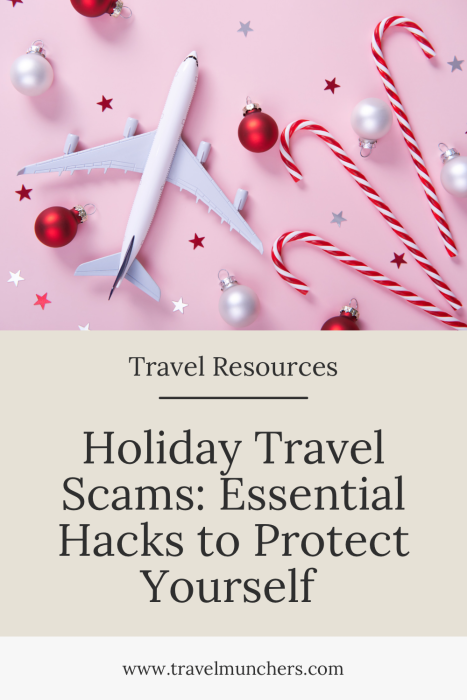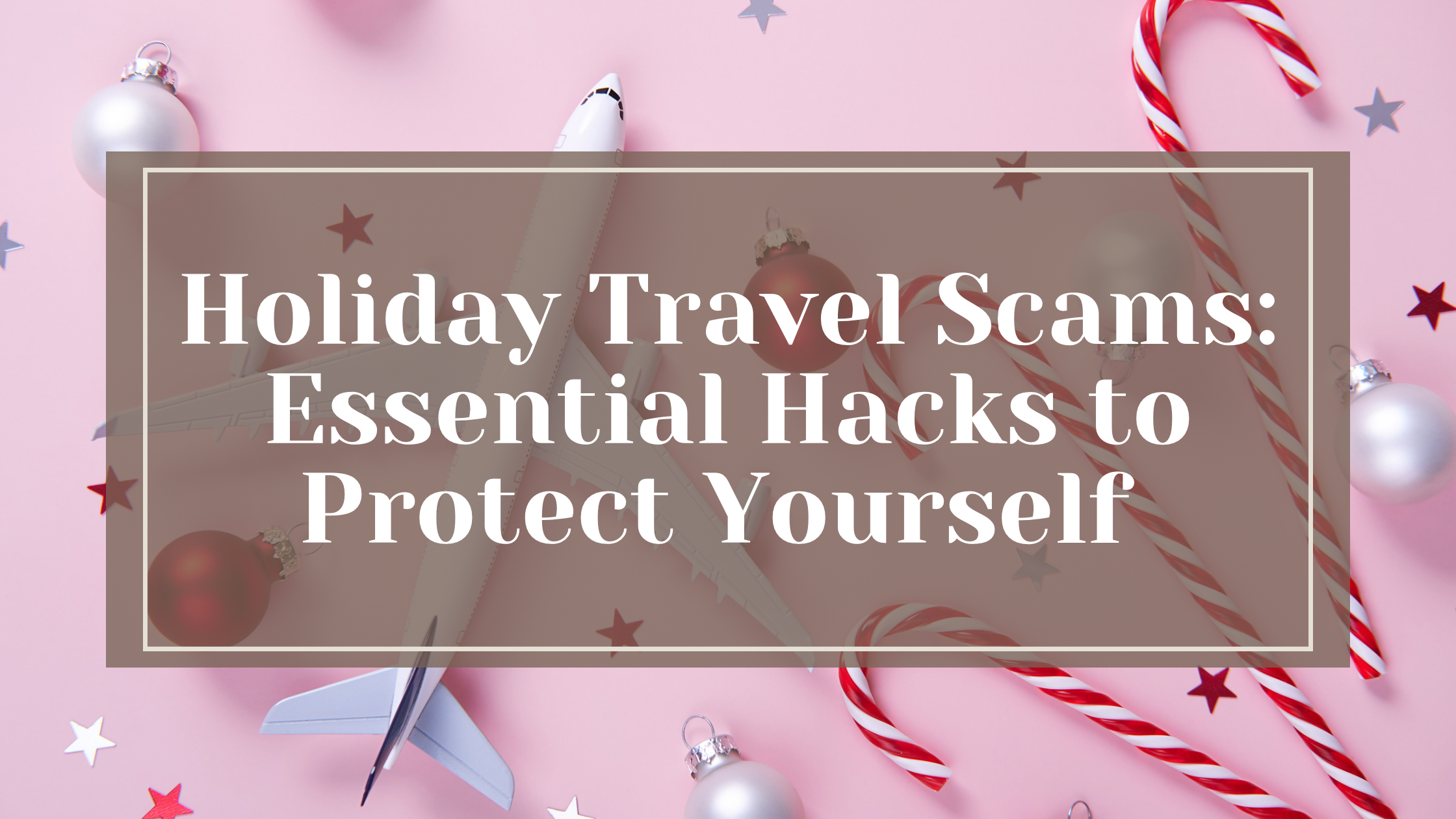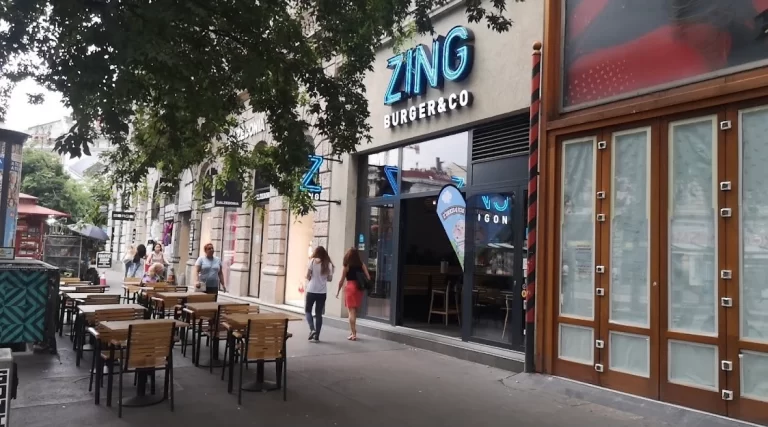Holiday Travel Scams: Essential Hacks to Safely Protect Yourself
Holiday Travel Scams: Essential Hacks to Safely Protect Yourself
As the holiday season approaches, the rise in travel scams has become a growing concern for travelers eager to enjoy their festive getaways. With more people booking trips and making travel arrangements online, scammers are increasingly targeting unsuspecting vacationers through fraudulent offers, fake websites, and too-good-to-be-true deals. From phishing emails that mimic legitimate travel agencies to deceptive vacation rental listings, these scams can lead to significant financial losses and ruined holiday plans. Understanding the common tactics used by fraudsters and staying vigilant is essential for protecting your travel investments during this busy season. Whether you’re planning a winter escape or visiting family, being aware of the rise in holiday travel scams is key to ensuring a safe and enjoyable holiday experience.
- Understanding Holiday Travel Scams
- Essential Hacks to Protect Yourself
- Recognizing Red Flags
- What to Do if You Are Scammed
In a Rush? Pin it to Read Later!

Copyright Notice: All material on this travel blog site is the sole property of Travel Munchers. This includes blog posts, pages, design and all photos (whether watermarked or not). Any use of materials from this site without express written consent will be considered copyright infringement.
Disclaimer: Some items contain affiliate links and I will get a small commission at no additional cost to you. I really appreciate your support if you like my recommendations!
Understanding Holiday Travel Scams
Common Holiday Travel Scams
- Fake Travel Deals and Discounts: Scammers offer incredibly low prices on flights, hotels, or vacation packages that are often too good to be true. Once payment is made, the deal vanishes, and the scammer disappears.
- Phishing Emails and Fake Booking Sites: Fraudsters send emails or create websites that mimic legitimate travel companies, tricking victims into providing personal information or credit card details.
- Vacation Rental Scams: Fake listings on popular vacation rental sites lure travelers with attractive properties at low rates. Victims may pay deposits or full rental fees only to find out the property doesn’t exist.
- Third-Party Booking Scams: Unreliable third-party booking sites or agents offer cheap rates but may cancel bookings last minute or overcharge for services, leaving travelers stranded.
- Fake Airline or Hotel Customer Service: Scammers create fake customer service numbers for airlines or hotels. When travelers call for assistance, they are asked to provide personal or payment information, which is then used for fraudulent purposes.
- Timeshare and Vacation Club Scams: Scammers offer free or discounted vacations in exchange for attending a presentation, which turns into a high-pressure sales pitch for worthless or overpriced timeshares.
- Wi-Fi Hotspot Scams: In airports or hotels, scammers set up fake Wi-Fi hotspots. Once connected, they can steal sensitive information from users, such as login credentials and credit card details.
- Baggage Claim Scams: Scammers may pose as baggage claim agents or airport staff, offering to help with lost luggage. They then demand fees or steal personal information.
- Taxi and Transportation Scams: Unlicensed taxi drivers or transportation providers overcharge tourists or take longer routes to increase fares. Some may even collaborate with criminals to stage fake accidents or robberies.
- Fake Currency Exchange Scams: Scammers offer currency exchange services at favorable rates but exchange your money for counterfeit bills or charge exorbitant fees.
Why Are Travelers More Vulnerable During the Holiday Season?
Travelers are particularly vulnerable to scams during the holiday season due to the high volume of travel, the rush to secure last-minute deals, and the general distractions that come with holiday preparations. Many people are eager to find the best prices on flights, hotels, and vacation packages, making them more susceptible to too-good-to-be-true offers. Additionally, the pressure to finalize plans quickly can lead to less cautious behavior, such as booking through unfamiliar websites or responding to unsolicited emails. The holiday season’s festive atmosphere also lowers vigilance, with travelers focused on reuniting with loved ones rather than spotting potential scams. This combination of urgency, excitement, and distraction creates the perfect opportunity for fraudsters to exploit unsuspecting vacationers.
Essential Hacks to Protect Yourself
Booking Safely
- Use trusted websites and apps for bookings.
- Double-check accommodation and transportation details.
- Avoid deals that seem too good to be true.
Verifying Before You Buy
How to research companies and vendors
Researching companies and vendors before making travel bookings is essential to avoid scams, especially during the holiday season. Start by checking for official websites with secure URLs (look for “https” in the address) and reading online reviews from trusted sources like Google, TripAdvisor, or Better Business Bureau (BBB). Verify their legitimacy by looking up their contact information, customer service reputation, and any potential red flags, such as complaints or negative feedback.
Social media platforms can also provide insights into customer experiences and company responsiveness. It’s also a good idea to ask for recommendations from friends or family who have used the service before. If the company is unfamiliar, check for certifications or affiliations with reputable travel organizations, such as the International Air Transport Association (IATA) or American Society of Travel Advisors (ASTA). Taking these steps can help ensure that you’re dealing with a trustworthy vendor, protecting both your travel plans and finances.
Tips for confirming legitimacy through reviews and official channels
Confirming the legitimacy of a travel company or vendor through reviews and official channels is a crucial step to avoid scams. Start by reading reviews on reputable sites like TripAdvisor, Yelp, or Google, paying attention to patterns of positive or negative feedback rather than just individual experiences. Look for consistency in the company’s service quality and watch out for overly glowing reviews that may be fake. Verify the business through official channels like the Better Business Bureau (BBB) to check for complaints or unresolved issues. Additionally, visit the company’s official website and social media pages to assess their professionalism and responsiveness to customer inquiries. For further confirmation, contact the company directly via official phone numbers or email addresses, and inquire about their licensing or memberships with trusted industry organizations. Taking these steps can help ensure that you’re dealing with a legitimate provider, safeguarding your travel plans.
Utilizing credit card protection for transactions
Utilizing credit card protection for transactions is a smart strategy for safeguarding your finances, especially when booking travel during the holiday season. Credit cards often offer built-in protections, such as fraud monitoring, chargeback rights, and travel insurance, which can help you recover funds if you fall victim to scams or fraudulent charges. Unlike debit cards or cash, credit card companies can dispute unauthorized transactions and temporarily withhold payment until the issue is resolved. Many credit cards also offer travel-related perks, such as trip cancellation insurance or coverage for lost luggage, providing an extra layer of security. When making travel purchases, always use a credit card over other payment methods to take full advantage of these protections and ensure peace of mind.
Staying Secure Online
Importance of using secure Wi-Fi and VPNs
Using secure Wi-Fi and VPNs is crucial for protecting your personal information while traveling, especially during the holiday season when many people are booking trips or managing travel plans on the go. Public Wi-Fi networks in airports, hotels, and cafes are prime targets for hackers who can intercept sensitive data, such as passwords, credit card numbers, and personal information. To minimize this risk, always connect to secure, password-protected networks and avoid accessing financial or sensitive accounts on public Wi-Fi. Using a Virtual Private Network (VPN) adds an additional layer of security by encrypting your internet connection, making it much harder for cybercriminals to access your data. Whether booking travel or just browsing online, using secure Wi-Fi and a VPN helps protect your privacy and keeps your information safe from potential threats.
Avoiding phishing scams via email and social media
Avoiding phishing scams via email and social media is essential for staying safe during the holiday travel season. Scammers often send deceptive emails or messages that appear to be from reputable travel companies, airlines, or booking platforms, enticing you with seemingly unbeatable deals or urgent notices. These phishing attempts aim to steal your personal information, such as login credentials or credit card details, by directing you to fake websites or asking you to download malicious attachments. To avoid falling victim, never click on links or open attachments from unknown sources, and double-check the sender’s email address for inconsistencies. Always verify deals and notifications directly on the company’s official website rather than through social media or email links. By staying cautious and verifying the legitimacy of messages, you can protect yourself from phishing scams during your holiday travel planning.
Tips for strong passwords and two-factor authentication
Using strong passwords and enabling two-factor authentication (2FA) are critical steps in securing your online accounts, particularly when managing travel bookings and financial transactions. To create a strong password, use a combination of uppercase and lowercase letters, numbers, and special characters, and avoid easily guessable information like birthdays or common words. Consider using a passphrase—a string of unrelated words that is both memorable and complex. Two-factor authentication adds an extra layer of security by requiring a second form of verification, such as a code sent to your mobile device or an authentication app, in addition to your password. This significantly reduces the risk of unauthorized access even if your password is compromised. Implementing these practices helps protect your sensitive information and provides peace of mind as you plan your travels and make online transactions.
Protecting Your Personal Information
Be cautious with sharing personal details
Being cautious with sharing personal details is essential for safeguarding your privacy and security, especially during travel planning and transactions. Avoid disclosing sensitive information such as your Social Security number, full address, or financial details unless absolutely necessary and only to trusted sources. Be wary of unsolicited requests for personal data via email, phone, or social media, as these could be attempts by scammers to gather information for fraudulent purposes. When booking travel or making reservations, ensure that you’re using secure and reputable websites or companies, and always verify the legitimacy of any request for personal details. By maintaining a high level of vigilance and sharing personal information sparingly, you can reduce the risk of identity theft and ensure a safer travel experience.
Using privacy settings on social media
Using privacy settings on social media is an important step in protecting your personal information from prying eyes, especially when traveling. Scammers and cybercriminals often scour social media profiles for details that can be used in phishing scams or identity theft, such as travel plans, locations, or even birthdays. By adjusting your privacy settings, you can control who sees your posts, personal details, and updates. It’s wise to limit visibility to trusted friends and family, and avoid sharing sensitive information publicly. Additionally, consider turning off location sharing to prevent broadcasting your travel whereabouts to strangers. Being mindful of your privacy settings helps you enjoy social media safely without compromising your security while traveling.
Recognizing and avoiding identity theft risks
Recognizing and avoiding identity theft risks is crucial for safeguarding your personal and financial information, especially during busy travel periods. Identity thieves often target travelers who may be less vigilant while on the go, using tactics such as stealing personal documents, skimming credit card information, or hacking into unsecured networks. To protect yourself, keep your passport, IDs, and credit cards secure at all times, and avoid carrying unnecessary personal documents. Monitor your bank and credit card statements regularly for unauthorized transactions, and consider using a credit monitoring service to detect suspicious activity. Be cautious when sharing personal information online or over the phone, and only use secure, trusted networks for transactions. By staying alert to these risks and taking proactive steps, you can significantly reduce the chances of falling victim to identity theft.
Being Aware on the Ground
Staying vigilant at airports, train stations, and tourist spots
Staying vigilant at airports, train stations, and tourist spots is essential for protecting yourself and your belongings from theft and scams. These busy locations are often prime targets for pickpockets and con artists who take advantage of crowded environments and distracted travelers. Keep your personal belongings, especially passports, wallets, and electronic devices, secure and close at hand, preferably in a concealed money belt or anti-theft bag. Be cautious of overly friendly strangers, offers of unsolicited help, or anyone trying to distract you. It’s also wise to be aware of your surroundings and avoid leaving luggage unattended, as this can attract both thieves and security issues. By staying alert and mindful of your possessions, you can ensure a safer and more enjoyable travel experience.
How to avoid pickpockets and street scams
Avoiding pickpockets and street scams requires a mix of awareness and precaution, especially in crowded tourist areas. It’s important to avoid looking like a tourist to help avoid becoming a target. To protect yourself, keep your valuables in secure, hard-to-reach places like a money belt, or use anti-theft bags with lockable zippers. Avoid carrying large sums of cash, and keep essentials like credit cards and IDs in separate, hidden compartments. Be cautious of common street scams, such as fake petitions, “found” jewelry tricks, or people offering unsolicited assistance. Distracting tactics, like someone bumping into you or asking for directions, are often used to divert your attention while an accomplice targets your belongings. Stay alert, avoid showing off expensive items, and always trust your instincts. By remaining vigilant and prepared, you can reduce the risk of falling victim to pickpockets and street scams during your travels.
How to Avoid Travel Scams by Not Looking Like a Tourist
Tips for keeping your belongings safe
Keeping your belongings safe while traveling requires a combination of smart packing, vigilance, and using the right tools. Start by minimizing the number of valuables you carry and store essential items like passports, credit cards, and cash in a secure money belt or hidden pouch. Opt for anti-theft bags with locking zippers or slash-resistant straps to deter thieves, and always keep bags zipped and close to your body, especially in crowded areas. Use hotel safes for storing extra cash, jewelry, or important documents, and never leave your belongings unattended in public spaces. When on the move, stay alert to your surroundings and avoid displaying expensive items like cameras or electronics. By following these tips, you can better protect your belongings and enjoy a worry-free travel experience.
Recognizing Red Flags
Common warning signs of scams (e.g., urgency, pressure to act quickly)
Common warning signs of scams often include tactics designed to create urgency and pressure you to act quickly without thinking. Scammers may send emails or messages that claim limited-time offers, last-minute deals, or urgent requests for payment to prevent you from losing out on a “special opportunity.” They might also use high-pressure sales techniques, insisting that you need to make an immediate decision to secure a booking or avoid a penalty. Additionally, vague or suspicious details, unsolicited communications, and requests for payment through unconventional methods like wire transfers or gift cards are red flags. If something feels too good to be true or you’re being rushed into making a decision, take a step back to verify the legitimacy of the offer before proceeding. Recognizing these warning signs can help you avoid falling victim to scams.
How scammers manipulate emotions and create a sense of urgency
Scammers often manipulate emotions and create a sense of urgency to trick people into making hasty decisions. They know that by tapping into feelings like fear, excitement, or greed, they can override your logical thinking. For example, they might send an alarming message claiming that your travel plans are in jeopardy unless you act immediately or present an irresistible offer that is only available for a limited time. By creating a false sense of scarcity or danger, scammers push you to respond quickly before you have a chance to verify the legitimacy of the situation. This emotional manipulation is a powerful tool that preys on your desire to avoid problems or seize a rare opportunity, making it easier for them to exploit you. Staying calm and taking the time to assess the situation can help you avoid falling into their trap.
What to Do If You’re Scammed
Immediate steps to take if you suspect you’ve been scammed
Cease Communication: Stop any ongoing interactions with the scammer. Do not respond to further emails, calls, or messages, as this could expose you to additional risks.
Report the Scam: Contact your bank or credit card company immediately to report the incident and dispute any unauthorized charges. Most financial institutions offer fraud protection and may be able to reverse charges or freeze your account to prevent further losses.
Change Your Passwords: If you’ve shared any login credentials or personal information, change the passwords on your accounts right away. Opt for strong, unique passwords and enable two-factor authentication for added security.
File a Report: Report the scam to relevant authorities, such as the Federal Trade Commission (FTC), your local consumer protection agency, or the platform where the scam occurred. Reporting helps prevent others from falling victim to the same scam.
Monitor Your Accounts: Keep a close eye on your bank accounts, credit card statements, and credit reports for any suspicious activity. Consider placing a fraud alert or credit freeze on your credit report to protect against identity theft.
Seek Professional Help: If your identity has been compromised, contact identity theft recovery services or legal professionals to guide you through the recovery process. Taking quick action can help limit the long-term impact of the scam.
Reporting to authorities and travel agencies
Reporting to authorities and travel agencies immediately after being scammed is a crucial step in protecting yourself and preventing further fraud. Start by notifying your bank or credit card company to block transactions and secure your accounts. Then, report the scam to local authorities, such as the police or the Federal Trade Commission (FTC), which can investigate and provide guidance on next steps. Additionally, contact the travel agency or platform where the scam occurred—many reputable companies have fraud departments that can assist in recovering funds or blocking fraudulent vendors. By promptly reporting the incident, you not only help protect yourself but also contribute to efforts that prevent others from falling victim to the same scam.
How to recover lost funds or cancel fraudulent transactions
Recovering lost funds or canceling fraudulent transactions requires swift action and thorough follow-up. Start by contacting your bank or credit card issuer immediately to report the fraud. They can help reverse unauthorized charges and may offer reimbursement, especially if you report the incident promptly. Provide all relevant details, such as transaction amounts and dates, to aid in their investigation. If the transaction was through a third-party payment service or platform, contact their customer support to dispute the charge and seek their assistance in recovering your funds. For additional support, file a complaint with consumer protection agencies or financial regulators, which can offer further recourse or guidance. Keep detailed records of all communications and actions taken to ensure a smooth recovery process and help in any potential investigations.
Need More Travel Tips?
💳 WANT TO TRAVEL FOR FREE?
Want to travel for free, simply as a reward for spending money you already had to spend ? I love my Capital One travel card and I think you will too! You get unlimited miles on every purchase with a card that fits your lifestyle. Plus 10x points on hotels and 5x points on flights booked through their travel portal!!! If you ever wanted to travel in luxury, this is the card for you. Check out our referral link!
🧳 NEED TRAVEL INSURANCE?
Peace of mind comes when you book travel insurance. You do not need to worry about flight cancelations, lost luggage, or any illnesses while traveling. Check out the first ever specific Digital Nomad insurance we use here : SafetyWing. ETKA, Vistors Coverage , or Insubuy.
NEED AN eSIM?
Check out our article on the top eSIM Providers for Digital nomads and world travelers:
Top eSIM Providers for Digital Nomads: Streamlining Connectivity While Traveling
NEED a Rental Car?
Check out the best options for renting a car for your trip to give you more freedom and flexibility while you travel ! Check out Rent A Car here.
Want Lounge Access when Flying?
If you want access to over 1,500 lounges in 600 locations then you need to check out Priority Pass!
Happy travels xx
Like it? Pin it!

Follow our adventures on social!
Copyright Notice: All material on this travel blog site is the sole property of Travel Munchers. This includes blog posts, pages, design and all photos (whether watermarked or not). Any use of materials from this site without express written consent will be considered copyright infringement.








